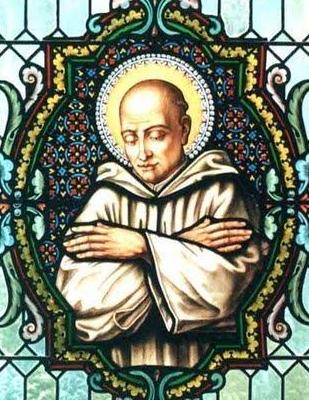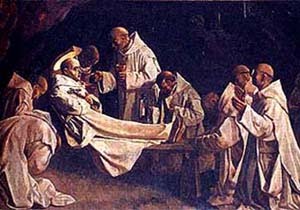
Reflecting on her years as a youth, Mother Catherine Aurelia Caouette said: “I could sense the Divine from an early age.” Most unusual about her childhood was her desire to spend long hours in a church for adoration. And this desire was actually manifested in her early years as she would spend hours in church on her knees gazing at the Tabernacle. Her parents noticed in her something special and when they confided to their parish priest about their daughter, he said to them: “You have a child of predilection. Watch carefully over your treasure.” She was permitted to receive her First Communion at age nine which was about three years sooner than the norm for that time.
As a student, she played the role of Saint Catherine of Alexandria, in the play written by Reverend Joseph Sabin Raymond titled: “The Martyrdom of Saint Catherine.” In that play young Aurelia proclaimed with great passion a line which touched the audience, and a line which she would later say that her extraordinary devotion to the Precious Blood of Jesus Christ was brought to light at that moment. The line in the play was: “I feel in my soul all the energy of the Divine Blood; it is a generous Blood which desires only to be shed.”
Father Joseph Sabin Raymond became her spiritual director. Because of Aurelia’s incredible

sanctity and Father Raymond’s expertise in spiritual matters, he told her to keep a diary to which she was obedient. Because of her obedience to making entries in the diary, the world knows a great deal about her interior life. In October of 1849, she wrote: “Lord, You know what my heart desires most ardently: to be united to You in Your Sacrament of Love. It is so consoling for a miserable creature to possess You. You inflame me with such a burning love, You inspire me with so many beautiful sentiments, that it seems heaven is in my heart. If, however, O my Divine Savior, I am not worthy to possess You now in Your heavenly home, I wish, at least, to go often to adore You in Your Tabernacle, where I have already passed so many happy moments, where You have spoken mysteriously to my soul and where You have so many times given Yourself to me.”
In November of 1849 was this entry: “O my God, I conjure You, increase my desire to love You, to belong to You alone. O my Jesus, I shall love You all my life. You alone shall possess my heart. It is towards You, it is towards heaven that I wish, above all, to elevate my thoughts, my affections. Dispose of my entire being as it shall please You, but grant me, O well beloved Jesus, Your holy love, because without it, life would be too long, too sad. May all my actions be a continual prayer and may my heart be always turned towards You, O Infinite Beauty!”
Keep in mind that these are the writings of a sixteen year old. Feeling an intimate closeness to the Blessed Mother as well, in December of 1849 she wrote: “O Mary, permit me today to bless you in seeing you so pure! I love you, I venerate you, all beautiful Dove, the favorite of God and of His Elect. Amiable Mother, do not fail to cast a tender look upon the wounds of my soul. Draw my heart towards you and have pity on me. O my Mother, I long for you, I burn with the desire of seeing you in heaven.”
In 1850, after finishing her studies, she returned to her family, but remained under the direction of Father Raymond, whereby she wanted to occupy her soul with God alone. The now seventeen year old submitted to Monsignor Raymond a plan for her spiritual life which included meditation, Mass, work, adoration, silence, and spiritual reading.
She very much saw God in His creation. She wrote: “How glorious and sublime it is to enjoy the sight of an exquisite night! This clear sky which is obscured by no cloud, these brilliant stars which ornament the azure firmament, the moon, that queen of night which diffuses its soft light, this calm, this peace which reigns in all places, inspire one with thoughts of heaven. Omnipotent God, how this silence touches my soul! How it fills it with religious sentiments!” Her mysticism is now becoming more apparent.
This was her experience of watching the Tabernacle on Holy Thursday night, as recorded in her diary: “The consideration of the Agony of Jesus has continually occupied my mind. I have mingled the tears of my repentance with the Blood of my Well Beloved. I have suffered with Him. At one o’clock I was left alone for a few moments. I do not know what secret sentiment inspired me, I dared in spite of my fears, to mount to the altar – I kissed it, I bathed it with my tears – I pressed my lips to the door of the Tabernacle which encloses our love. It felt so good to be so near! I blessed, I loved, I thanked, I wept over my numerous sins. As I saw the Divine Blood flow in large drops, I presented to Him our souls. He blessed them in His Sacred Heart. Jesus asked the sacrifice of my entire self, docility and submission. I have the firm conviction that He will make me share some of His sufferings. I can suffer; it is my consolation! I wish only for suffering.”
In her spiritual hunger she wrote: “Father, the remembrance of Communion returns to me unceasingly. I am dying of hunger!”
In 1851 a dire illness kept her in bed for ten months. She said that she was cured miraculously at the end of a novena to Saint Catherine of Siena. She wrote: “It seemed to me that I saw my amiable protectress. Her whiteness equaled that of the lily. She was dazzling with grace and beauty and seemed to be blessing me with her hand in the Name of Jesus Christ, and in a whisper, she told me to hope and love.” This started what would blossom into a great devotion to Saint Catherine of Siena.
In 1853 she made a pilgrimage to Our Lady of Succor in Montreal. She told Father Raymond of her mystical experience there in which she saw the Blessed Virgin clothed in dazzling white, praying to her Son. Our Lady told her to make frequent Communions to console Jesus because of the many souls that forget Him.
Providence led to her to be the Founder of the Sisters Adorers of the Precious Blood, the first contemplative Order of nuns whose beginnings were in St. Hyacinth, Quebec. It was her deep contemplation of Christ’s love through His Passion which led to her great devotion of the Precious Blood.
The cause for her canonization officially began in November of 1984.
 Greetings Everyone!
Greetings Everyone!




























